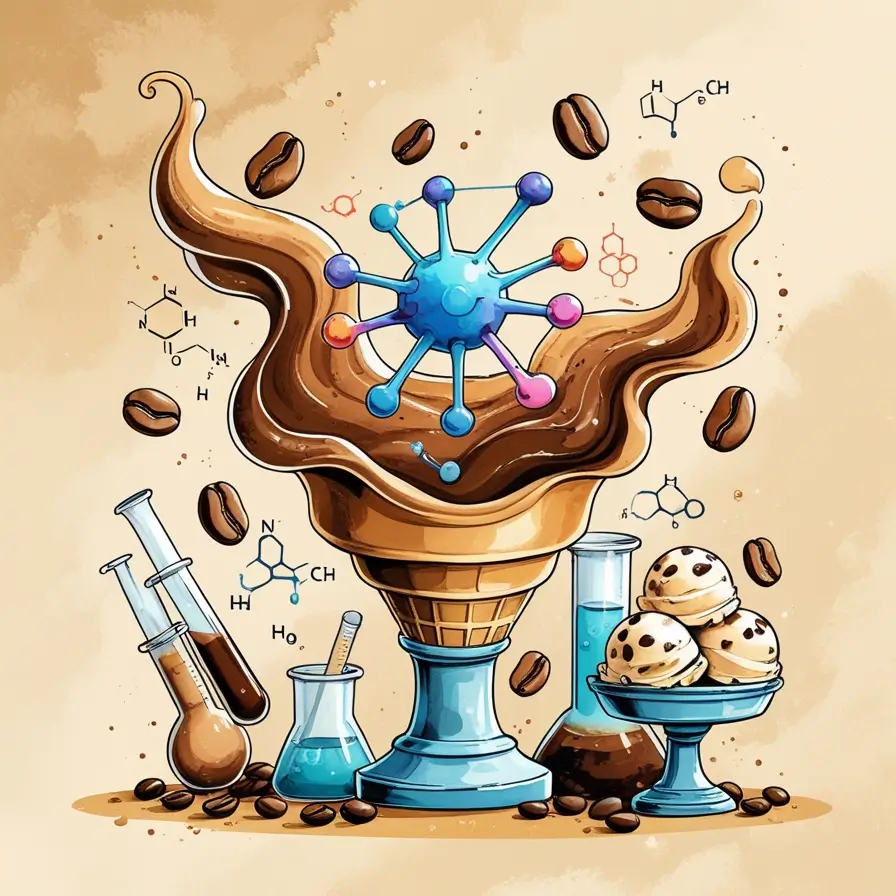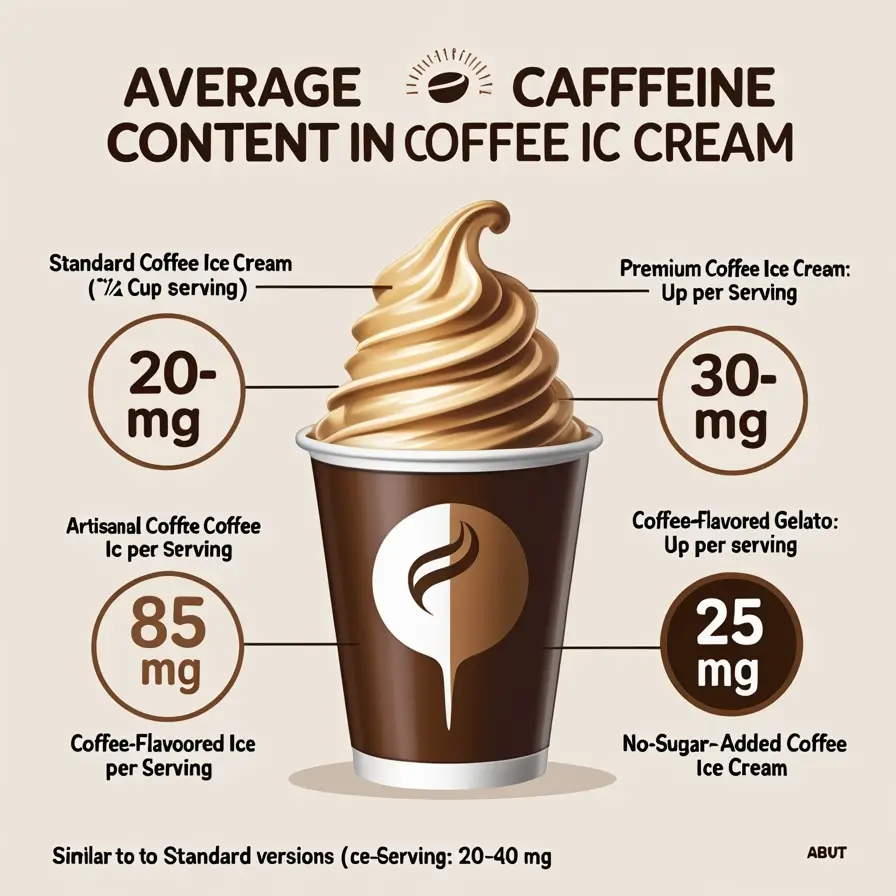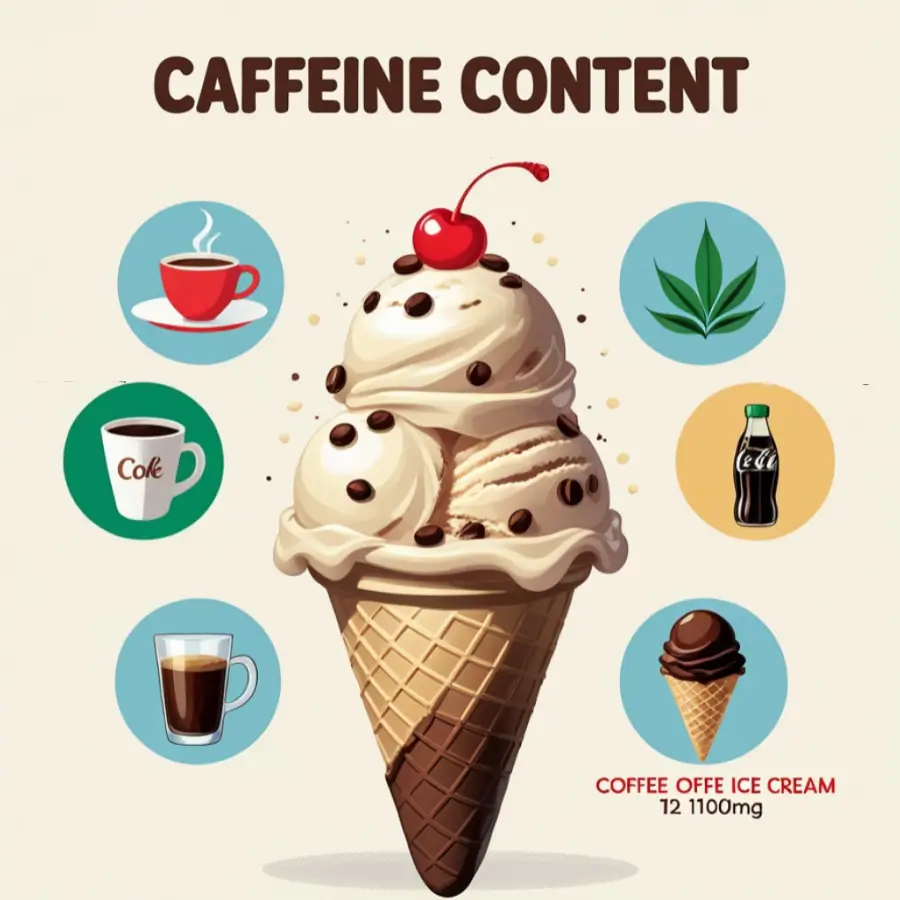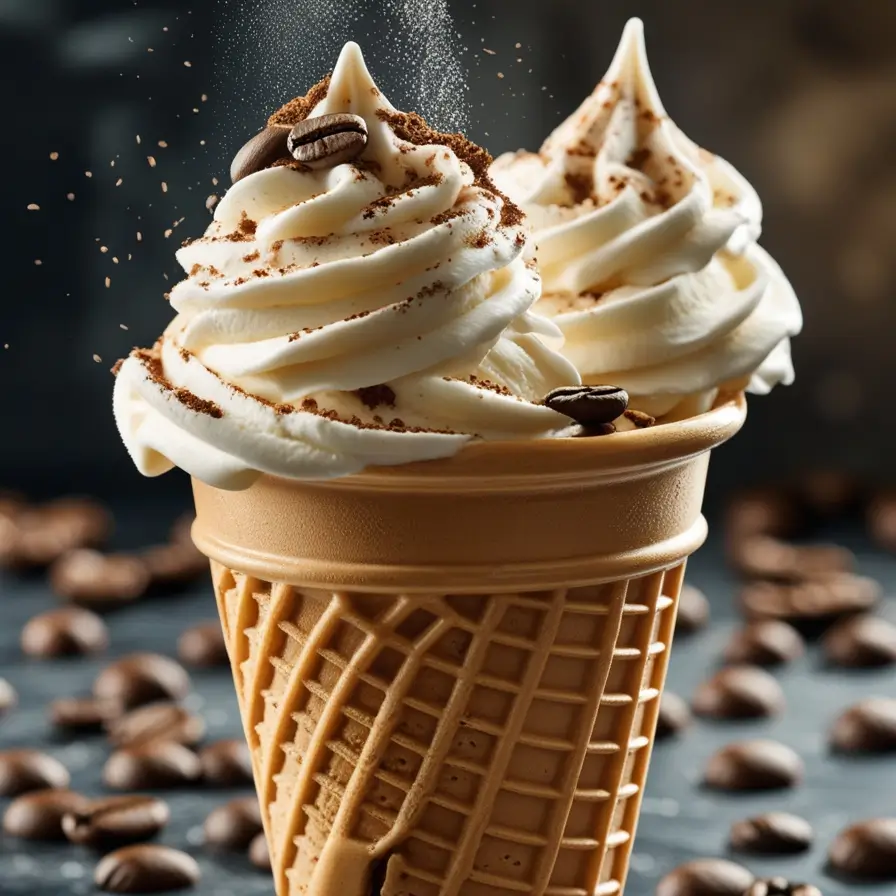
Does coffee ice cream have caffeine? This question often crosses the minds of caffeine-sensitive individuals, parents, or those trying to monitor their daily caffeine intake. The short answer is yes – coffee ice cream does contain caffeine, though the amount can vary significantly depending on the brand, preparation method, and ingredients used. As a coffee enthusiast and food industry expert, I’ll guide you through everything you need to know about the caffeine content in your favorite frozen dessert.
1. The Science Behind Caffeine in Coffee Ice Cream

Coffee ice cream gets its characteristic flavor and caffeine content from real coffee or coffee extracts used in its preparation. Unlike artificial flavoring, which merely mimics the taste of coffee, authentic coffee ingredients contribute both flavor and active compounds, including caffeine, to the final product.
Key factors affecting caffeine content in coffee ice cream:
Manufacturing Process: Brands using real coffee beans or espresso in their production typically have higher caffeine content compared to those using coffee extracts or artificial flavoring.
Coffee Concentration: The amount of coffee or coffee extract used in the recipe directly impacts the caffeine levels. Premium brands often use more concentrated coffee ingredients for a more authentic taste.
Serving Size: Larger portions naturally contain more caffeine, making portion awareness important for those monitoring their caffeine intake.
Type of Coffee Used: Different coffee varieties and roast levels can affect the final caffeine content in the ice cream.
2. Average Caffeine Content in Coffee Ice Cream

Understanding the typical caffeine content in coffee ice cream helps you make informed decisions about consumption, especially if you’re sensitive to caffeine or monitoring your intake.
Common caffeine levels found in coffee ice cream:
Standard Coffee Ice Cream (½ cup serving): 20-40 mg of caffeine
Premium Coffee Ice Cream Brands: 30-60 mg per serving
Artisanal Coffee Ice Cream: Up to 80 mg per serving
Coffee-flavored gelato: 25-45 mg per serving
No-Sugar-Added Coffee Ice Cream: Similar to standard versions, 20-40 mg
3. Comparing Coffee Ice Cream to Other Caffeinated Products

To put these numbers in perspective, let’s compare the caffeine content of coffee ice cream to other common sources:
Regular Coffee (8 oz): 95-200 mg
Espresso Shot (1 oz): 63-75 mg
Coffee Ice Cream (½ cup): 20-60 mg
Green Tea (8 oz): 28-38 mg
Cola (12 oz): 30-40 mg
Dark Chocolate (1 oz): 12-30 mg
4. Health Considerations When Consuming Coffee Ice Cream

While coffee ice cream generally contains less caffeine than a cup of coffee, certain individuals should still be mindful of their consumption.
Important considerations include:
Time of Consumption: Eating coffee ice cream late in the day might affect sleep patterns, especially for caffeine-sensitive individuals.
Individual Sensitivity: Some people may experience effects from even small amounts of caffeine, making it important to know your tolerance.
Cumulative Daily Intake: Remember to factor in coffee ice cream when calculating your total daily caffeine consumption from all sources.
* Medical Conditions: Certain health conditions may require limiting caffeine intake, making it essential to consult healthcare providers about coffee ice cream consumption.
5. Impact on Different Age Groups
Detailed analysis of how coffee ice cream affects various age groups.
Age-specific considerations:
Infants and Toddlers (0-3 years):
- Not recommended due to caffeine sensitivity
- Potential sleep disruption
- Alternative flavors suggested
Young Children (4-12 years):
- Limited consumption advised
- Monitoring for hyperactivity
- Portion size importance
Teenagers (13-19 years):
- Moderate consumption acceptable
- Awareness of combined caffeine sources
- Time of day considerations
Adults (20-64 years):
- Standard consumption guidelines apply
- Individual tolerance assessment
- Combination with other caffeine sources
Seniors (65+ years):
- Increased sensitivity consideration
- Medication interactions
- Modified portion recommendations
6. Does Coffee Ice Cream Have Caffeine in Different Brands?
Different brands vary significantly in their caffeine content, largely due to their manufacturing processes and ingredients.
Popular brands and their approximate caffeine content:
Häagen-Dazs Coffee Ice Cream: 30-40 mg per ½ cup
Ben & Jerry’s Coffee Buzz Buzz: 45-60 mg per ½ cup
Breyers Coffee Ice Cream: 20-30 mg per ½ cup
Store Brand Coffee Ice Cream: 15-25 mg per ½ cup
Artisanal/Local Brands: Varies significantly, often 30-80 mg per ½ cup
7. Impact on Special Populations
Understanding how coffee ice cream affects different groups is crucial for making informed consumption decisions.
Considerations for specific populations:
Children: Should generally avoid or limit coffee ice cream due to caffeine sensitivity
Pregnant Women: Should monitor total caffeine intake, including from ice cream
Elderly Individuals: May be more sensitive to caffeine effects
Athletes: Might benefit from timing consumption around training sessions
People with Sleep Disorders: Should avoid consumption in the evening
8. Seasonal Consumption Patterns
Understanding how weather and seasons affect coffee ice cream consumption and caffeine impact.
Seasonal variations:
Summer Consumption:
- Higher overall consumption
- Different absorption patterns
- Hydration considerations
Winter Consumption:
- Lower consumption rates
- Alternative serving methods
- Indoor temperature effects
9. Alternatives to Traditional Coffee Ice Cream
For those looking to enjoy the coffee flavor without caffeine, several alternatives exist:
Available options include:
Decaf Coffee Ice Cream: Made with decaffeinated coffee
Coffee-Flavored Non-Dairy Alternatives: Often contain less or no caffeine
Natural Coffee-Flavored Options: Using artificial flavoring instead of real coffee
Homemade Versions: Allowing control over caffeine content
Coffee-Free “Mocha” Alternatives: Using cocoa for a similar taste profile
10. Making Informed Choices About Coffee Ice Cream Consumption
To make the best decisions about consuming coffee ice cream, consider these practical tips:
Smart consumption guidelines:
* Read Labels Carefully: Look for caffeine content information and serving sizes
* Track Total Daily Caffeine: Include coffee ice cream in your daily caffeine calculations
* Consider Timing: Avoid consumption close to bedtime if caffeine-sensitive
* Watch Portion Sizes: Larger servings mean more caffeine
* Know Your Sensitivity: Pay attention to how your body responds to caffeine
11. Future Trends in Coffee Ice Cream Production
The coffee ice cream market continues to evolve with innovations and consumer preferences:
Emerging trends include:
* Enhanced Caffeine Content Labeling: More transparent information about caffeine levels
* Customizable Caffeine Options: Products with varying caffeine content for different preferences
* Natural Alternatives: New methods for creating coffee flavor without caffeine
* Functional Additions: Incorporation of other beneficial compounds alongside caffeine
* Sustainable Production: Focus on environmentally conscious coffee sourcing
12. Tips for Enjoying Coffee Ice Cream Responsibly
Making the most of your coffee ice cream experience while managing caffeine intake:
Practical recommendations:
Start with Small Portions: Especially if you’re new to coffee ice cream
Combine with Non-Caffeinated Flavors: Mix with vanilla or chocolate to reduce caffeine per serving
Check Serving Sizes: Be aware that restaurant portions often exceed standard serving sizes
Consider Time of Day: Earlier consumption allows more time for caffeine metabolism
Monitor Personal Response: Keep track of how different brands and amounts affect you
Does Coffee Ice Cream Have Caffeine
Understanding the presence and amount of caffeine in coffee ice cream helps you make informed decisions about consumption. While the caffeine content is generally lower than a cup of coffee, it’s still significant enough to consider, especially for sensitive individuals or those monitoring their caffeine intake. By being aware of serving sizes, brand variations, and personal sensitivity, you can enjoy this delicious treat while managing your caffeine consumption effectively.
Remember that coffee ice cream can be part of a balanced diet when consumed mindfully. Whether you’re a coffee enthusiast or just enjoy the occasional scoop, knowing the facts about caffeine content helps you make choices that align with your dietary needs and preferences.
For those specifically wondering “Does coffee ice cream have caffeine?” – the answer is a definitive yes, but with the knowledge provided in this article, you can now make informed decisions about your consumption and enjoy this frozen treat responsibly.




